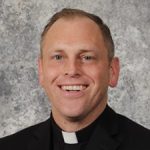 Dear Brother Knights,
Dear Brother Knights,
We are amid the holiest time in the Church’s liturgical year. It’s a time where God wants to do great things in us. We know very well that within the season of Lent, we take on greater prayer, fasting, and almsgiving to make room for the Lord to do these great things in us.
We don’t do this alone. Any blessing that we receive in the season of Lent or Easter is us accepting and receiving a grace from God. He will help us have a good Lent and a joyful Easter. We also have the assistance of our brothers and sisters in Christ. We enter into this penitential season together.
I even look at our Knights of Columbus Friday fish fry dinners in this light. Despite our extra sacrifices and giving of alms, the season is not meant to be dull and miserable. But rather, it can be a time of community among fellow Christians and an invitation to those around us. And I thank all that are involved in the fish fry dinners for bringing the community together.
May God bless you and your families with many graces in the holy season of Lent and much rejoicing in the resurrection as we celebrate Easter.
Sincerely in Christ,
Father Nicholas Kipper

